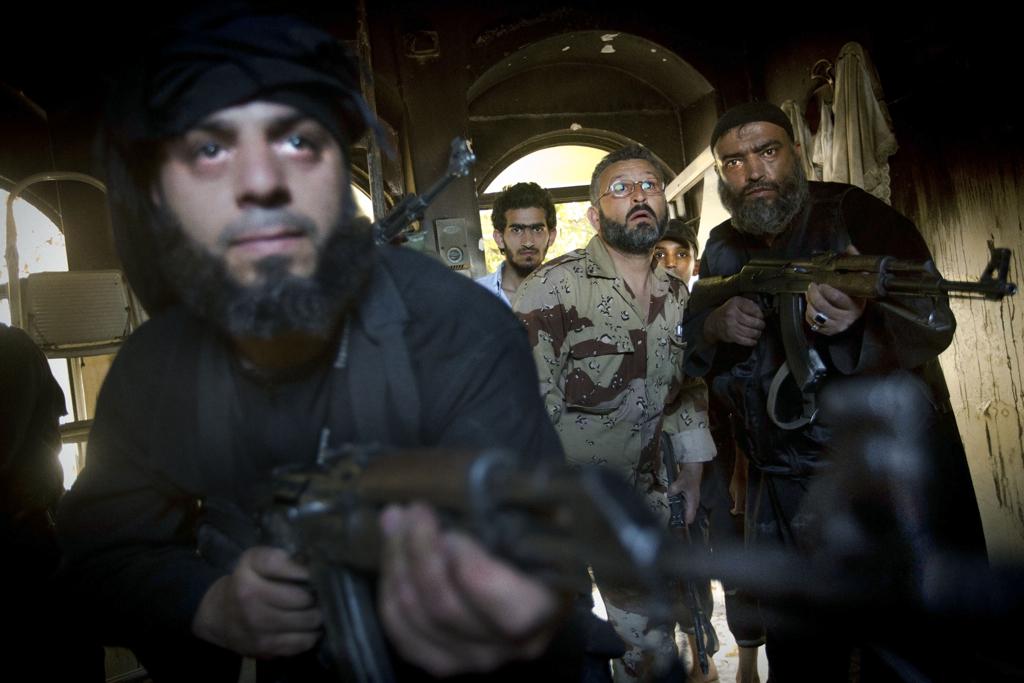Among Syria’s rebels, anger at US about-face
Syrian rebels take position in a house during clashes with regime forces in the old city of Aleppo on May 22, 2013.
Editor's note: The United States and Russia reached an agreement Saturday to rid Syria of its chemical weapons stores by mid-2014, effectively canceling any plan for a US military strike. Free Syrian Army chief Gen. Salim Idriss rejected the deal outright, saying, "I and my brothers in arms will continue to fight until the regime falls."
BEIRUT, Lebanon — The United States will “betray the world” if it does not launch military strikes against Syrian regime forces.
At least that's what Mohammed Saeed, a rebel fighter in Syria’s largest city, Aleppo, says.
Many of the rebels that are fighting against the government of Syrian President Bashar al-Assad feel the same. After more than two years of civil war, during which the West has repeatedly promised to aid the rebels in the battle, the anti-Assad fighters finally thought they had caught a break.
The US was readying for an air campaign against Assad forces, following a ghastly chemical weapons attack on rebel-held neighborhoods in Damascus Aug. 21. The US and other western nations like Britain and France blame Assad for the assault, which killed hundreds, and said the dictator should be punished.
But now, the administration of President Barack Obama has backed off military intervention in favor of diplomacy to defuse the crisis and possibly strip Assad of his chemical weapons stockpiles, with the help of Syria’s Russian allies.
Obama had said a year ago that the use of chemical weapons in the Syrian conflict — which has killed more than 100,000 — would be a “red line” for his administration.
The US Navy’s 6th Fleet, a naval striking force, remains in the eastern Mediterranean to keep the pressure on Assad. But military force — which some rebels had hoped might tip the balance in their favor, despite Obama assurances strikes would be limited — is at least temporarily off the table.
More from GlobalPost: Why some Syrian rebels don't support Obama's plan to hit Assad
Louay al-Mokdad, political and media coordinator for the Free Syrian Army, an umbrella coalition that groups together some of the armed militias fighting Assad, says the push to disarm the Syrian leader is a “trick” designed to buy his regime more time to continue his military campaign.
Secretary of State John Kerry met with Russian Foreign Minister Sergei Lavrov in Geneva Thursday to discuss a plan to dismantle Syria’s chemical weapons. Many experts say any scheme would be unworkable in the midst of a civil war.
Even as Syria’s envoy to the United Nations announced Thursday that his government had signed the Chemical Weapons Convention, which would require Syria to destroy all stocks, a report Friday in The Wall Street Journal said Assad government forces had already scattered the chemical weapons to as many as 50 sites across the country.
In a video communiqué released Thursday, the chief of staff of the FSA’s Supreme Military Council, Brig. Gen. Salim Idriss, rejected the Russian disarmament proposal.
Idriss and others have openly lamented that they have yet to receive the weapons Obama pledged to begin sending earlier this summer.
US lawmakers are worried about the growing ranks of extremists and Al Qaeda-style fighters opposed to Assad — that these groups, well-trained and showing strength on the battlefield, may get their hands on sophisticated weapons and eventually turn them back on the US.
Mokdad says the relationship between the FSA leadership — which is moderate — and the US is strong.
But if the US fails to both carry out strikes and deliver military aid, “Syrian blood will be on your hands,” Mokdad said.
Almost immediately after it became clear the US would not imminently hit Syria, Assad warplanes began again pounding rebel-held areas of Damascus. The airstrikes had been halted following the Aug. 21 attack and international diplomatic fallout.
“From the first days of the revolution, before Bashar al-Assad used chemical weapons, before [Al Qaeda-linked] Jabhat al-Nusra came to Syria, before all this happened, a lot of Syrian activists said we need a no-fly zone,” said Burhan Mousa Agha, a 28-year-old Syrian refugee and activist from Homs, in central Syria, but who now lives in Switzerland.
Syrians rose up against Assad in March 2011, as part of the Arab Spring. But a government crackdown pushed many once-peaceful demonstrators to take up arms. After NATO intervened to assist Libya’s rebels, Syrians hoped the international community would do the same for them.
“If the Americans helped the Syrian revolution from the first days of the revolution and changed the regime, how would the people look at America?” said Agha. “They would say you are our brother.”
But instead, after the US dangled the hope of imminent military strikes only to take a step back and endorse a diplomatic track, Syrians like Agha are getting fed up.
Mohammed, a 20-year-old refugee also from Homs, said he too was frustrated at the delay and inaction. Like some other Syrian refugees in Lebanon, he was uncomfortable giving his last name when addressing politicized topics.
“They should invade,” he said of the West. But “by common sense, nothing will happen. If it was going to happen, it would have happened.”
More from GlobalPost: Here's what Syrians have to say about intervention
Mohammed spoke at a United Nations refugee registration center in Beirut, where he was waiting to set up an appointment so he can receive aid.
With more than 726,000 refugees registered or awaiting registration with the UN, aid agencies say 1 in 4 people inside Lebanon are now refugees. And there is no sign the killing with conventional weapons is letting up.
“At the end of the day,” al-Mokdad said, the US and Europe “will know that Bashar al-Assad knows nothing except force.”
